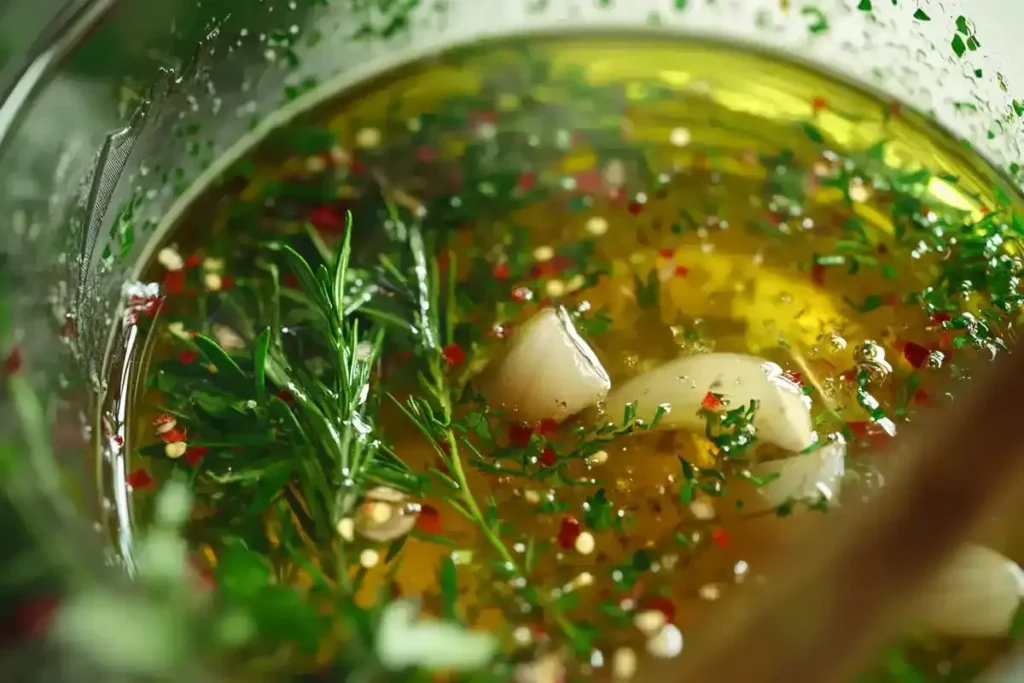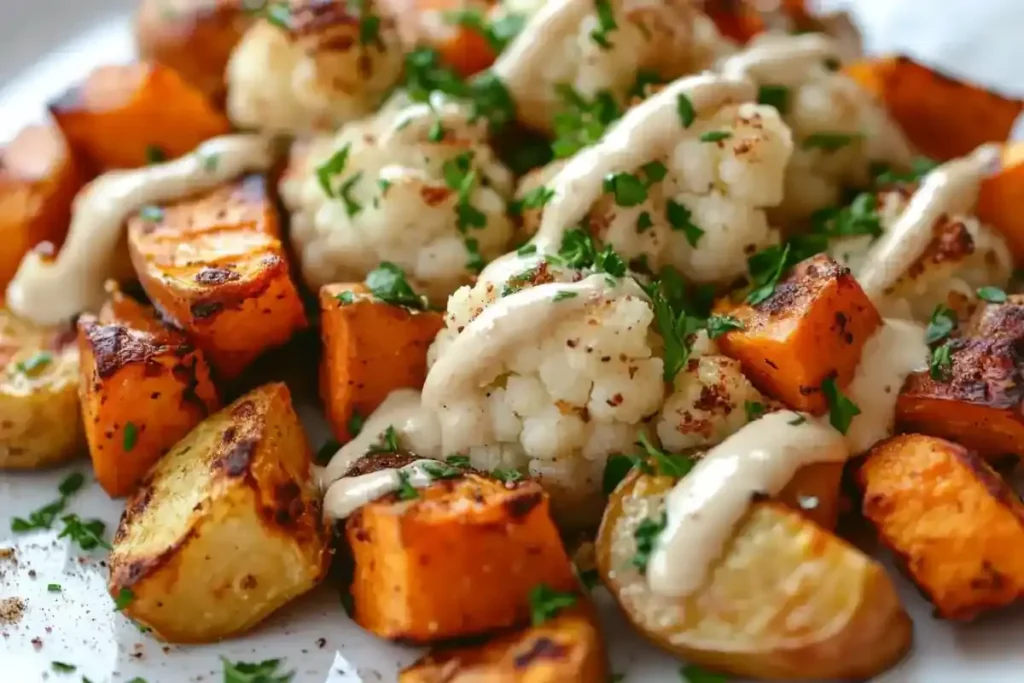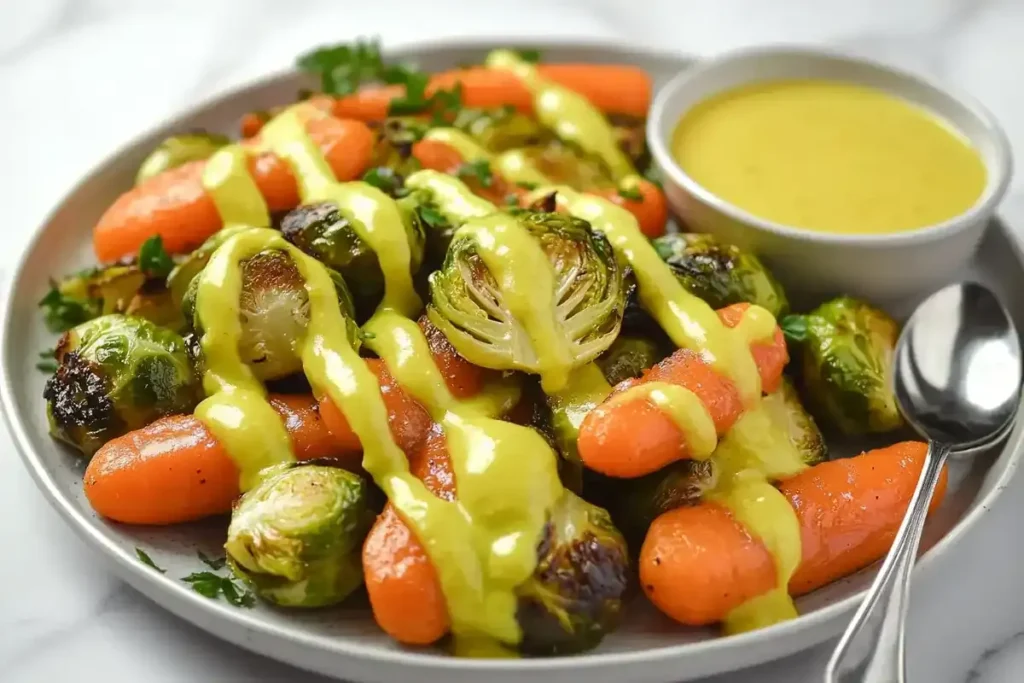Introduction: Transform Your Roasted Vegetables with the Perfect Sauce
Roasted vegetables are a simple yet delicious way to bring out the natural flavors of your favorite produce. But let’s face it—sometimes, they need a little extra flair to take them from good to unforgettable. That’s where a sauce for roasted vegetables comes in. Whether creamy, tangy, or herbaceous, the right sauce can elevate roasted veggies into a dish you’ll crave.
In this article, we’ll explore why sauces are a game-changer, dive into the best options, and share an easy recipe you can try at home. You’ll also learn about nutritional benefits and expert tips to create a sauce that’s as versatile as it is flavorful. Ready to up your roasted veggie game? Let’s get started!
Why Sauces Matter for Roasted Vegetables
Why Sauces Enhance Roasted Vegetables
Roasting vegetables caramelizes their natural sugars, creating a slightly sweet and smoky flavor. While this is delicious on its own, adding a sauce brings contrast and complexity to the dish. A creamy sauce can balance out roasted broccoli’s crispiness, while a tangy lemon dressing can brighten roasted carrots or asparagus.
Moreover, sauces allow for customization, making roasted vegetables more exciting. With just a drizzle or dip, you can transform the same batch of veggies into entirely different meals. This versatility is why sauces for roasted vegetables are an essential kitchen tool.
Common Types of Sauces for Vegetables
When it comes to pairing sauces with roasted veggies, there’s no shortage of options. Here are the most popular types:
- Creamy Sauces: Think yogurt-based dressings, tahini, or cashew cream. These pair wonderfully with heartier vegetables like sweet potatoes or cauliflower.
- Tangy Sauces: Lemon garlic, vinaigrettes, or mustard-based dressings bring brightness to earthy veggies like Brussels sprouts.
- Herb-Infused Sauces: Pesto, chimichurri, or dill-heavy green goddess dressings are perfect for leafy greens and root vegetables.
Each sauce type complements different vegetables, making your roasted dishes as versatile as they are flavorful.

Exploring the Best Sauces for Roasted Vegetables
1. Creamy Sauces
Creamy sauces are a fantastic match for roasted vegetables, adding richness and a luscious texture. Options like tahini, cashew cream, or yogurt-based sauces are especially popular. These sauces pair beautifully with vegetables like roasted cauliflower or sweet potatoes, balancing their natural sweetness with a velvety finish.
For instance, a simple tahini dressing made with tahini, lemon juice, and a splash of water can transform even the simplest roasted vegetables into a gourmet dish. This versatility is why a creamy sauce for roasted vegetables is often a go-to for home cooks.
2. Tangy and Zesty Sauces
Tangy sauces bring brightness and a punch of flavor that complements the caramelized edges of roasted vegetables. Popular choices include vinaigrettes, lemon garlic dressing, or mustard-based sauces. These options are especially well-suited for earthy vegetables like Brussels sprouts, carrots, or asparagus.
A zesty lemon garlic sauce, for example, can be whipped up with olive oil, minced garlic, lemon juice, and a pinch of salt. This combination enhances the flavors of roasted veggies while adding a refreshing tang that’s hard to resist.
3. Herb-Infused Sauces
Herb-infused sauces like chimichurri, pesto, or green goddess dressing not only bring fresh, aromatic flavors to the table but also elevate the overall taste experience. Additionally, these sauces work wonders with roasted root vegetables such as carrots and parsnips, while also complementing leafy greens like kale and spinach. Moreover, the vibrant colors and refreshing flavors of herb-based sauces make them a versatile addition to almost any vegetable dish.
For a quick and easy herb sauce, simply blend fresh parsley, cilantro, olive oil, garlic, and vinegar. As a result, you’ll have a vibrant, flavorful addition that not only enhances taste but also elevates any roasted vegetable dish. Additionally, this sauce is versatile enough to pair with a variety of veggies, making it a go-to option for quick meals.
If you’re looking for other ways to enhance your roasted vegetable recipes, you might enjoy exploring our Carrot Walnut Cake Recipe for ideas on combining flavors and textures.

The Ultimate Sauce Recipe for Roasted Vegetables
Ingredients for a Versatile Herb-Infused Sauce
- 1 cup fresh parsley leaves
- ½ cup fresh cilantro leaves
- 1 clove garlic (minced)
- ½ cup olive oil
- 2 tablespoons red wine vinegar
- 1 teaspoon salt
- ½ teaspoon ground black pepper
- Optional: A pinch of red pepper flakes for heat
Step-by-Step Cooking Instructions for the Sauce
1: Prepare the Ingredients
Wash and dry the parsley and cilantro leaves thoroughly to avoid excess moisture. Mince the garlic finely or use a garlic press for a smoother consistency.
2: Blend the Sauce
In a blender or food processor, combine the parsley, cilantro, garlic, olive oil, and vinegar. Blend until smooth. If the sauce is too thick, add a tablespoon of water at a time until you reach your desired consistency.
3: Season and Adjust
Add salt, pepper, and red pepper flakes (if using). Taste the sauce and adjust the seasoning as needed, adding more vinegar for tanginess or olive oil for richness.
4: Store and Serve
Transfer the sauce to an airtight container. It can be refrigerated for up to a week. Serve drizzled over roasted vegetables or as a side for dipping.
Nutritional Information for Sauce and Roasted Vegetables
Nutritional Benefits of Pairing Sauces with Vegetables
Pairing roasted vegetables with the right sauce not only enhances flavor but also boosts their nutritional value. Many sauces, especially those made with healthy fats like olive oil or tahini, improve nutrient absorption. For example, fat-soluble vitamins A, D, E, and K found in vegetables like carrots or spinach are better absorbed when paired with a creamy or oil-based sauce for roasted vegetables.
Moreover, adding herbs and spices to sauces can provide antioxidants and anti-inflammatory benefits. Fresh parsley, garlic, or citrus juice enhances not only the taste but also the health factor of your meal.
Nutritional Content Table
Below is the nutritional breakdown for a standard herb-infused sauce per 100g:
| Nutrient | Amount (per 100g) |
|---|---|
| Calories | 150 kcal |
| Protein | 2 g |
| Carbohydrates | 4 g |
| Sugars | 1 g |
| Fat | 13 g |
| Sodium | 200 mg |
By understanding the nutritional composition, you can easily adjust the ingredients to match your dietary needs, such as lowering the sodium content or adding extra herbs for flavor without calories.
Tips for Making the Best Sauce for Roasted Vegetables
Avoiding Common Mistakes
Even the simplest sauce can go wrong if you’re not careful. Here are some common mistakes to avoid:
- Overpowering Flavors: Adding too much garlic or vinegar can dominate the sauce and overshadow the natural taste of roasted vegetables. Always balance the ingredients for a harmonious flavor.
- Too-Thin Consistency: A watery sauce won’t cling to vegetables properly. To fix this, blend in more olive oil or add a thickening agent like tahini.
- Not Blending Properly: Unblended chunks of herbs or garlic can make the sauce uneven. Use a food processor or blender to achieve a smooth texture.
Customizing Sauces to Suit Your Taste
One of the best things about making a sauce for roasted vegetables is its versatility. You can tweak the recipe to suit your preferences. For example:
- Add Sweetness: Include a drizzle of honey or maple syrup for a hint of sweetness.
- Spice It Up: Incorporate chili flakes or cayenne for a spicy kick.
- Make It Nutty: Blend in a spoonful of almond butter or cashews for added creaminess.
If you’re looking for more creative ideas to complement your meals, check out our Tortellini Recipes with Flavorful Pairings for inspiration.

Frequently Asked Questions (FAQs)
1. What’s the Best Sauce for Roasted Vegetables?
The best sauce for roasted vegetables depends not only on your preferences but also on the vegetables you’re serving. For instance, creamy sauces like tahini or cashew cream pair well with hearty options like sweet potatoes. On the other hand, tangy sauces, such as lemon garlic vinaigrette, help brighten the flavors of greens and asparagus. Meanwhile, herb-infused sauces like chimichurri are perfect for roasted root vegetables. Ultimately, experimenting with different sauces ensures you’ll find the perfect match for every dish.
2. Can I Make Sauces Ahead of Time?
Yes, most importantly, sauces for roasted vegetables can easily be made ahead of time. In fact, preparing sauces in advance not only saves time but also allows the flavors to deepen, ultimately resulting in a richer taste. Additionally, you can store your sauce in an airtight container in the fridge for up to a week. For even longer storage, consider freezing them in small portions to maintain freshness and convenience. Always stir or whisk the sauce before serving to refresh its texture.
3. Are Sauces for Roasted Vegetables Healthy?
Sauces can be a healthy addition to roasted vegetables if made with wholesome ingredients. Opt for olive oil, fresh herbs, and natural seasonings to keep them light and nutritious. Avoid store-bought sauces with high sugar or sodium levels, or try homemade versions to control what goes into them. A balanced sauce can elevate both the taste and nutritional value of your roasted veggies.
4. Can I Use Store-Bought Sauces for Roasted Vegetables?
Store-bought sauces are a convenient option, but it’s important to choose high-quality ones. Look for sauces with natural ingredients and no added preservatives. Options like pesto or a simple vinaigrette work well with roasted vegetables. However, making your own sauce allows you to customize the flavors and ensures freshness.
Conclusion – Elevating Roasted Vegetables with Sauces
Why Sauces Transform Simple Dishes
Adding a sauce for roasted vegetables turns a simple side dish into a culinary delight. The right sauce can enhance the natural flavors of vegetables, provide a satisfying texture contrast, and make your meal feel more complete. Whether you prefer creamy, tangy, or herbaceous sauces, each one brings its own magic to the table.
Encouraging Experimentation
One of the joys of cooking is experimenting with flavors. Don’t be afraid to try new combinations or adjust recipes to suit your taste. A pinch of spice or a drizzle of sweetness can transform a basic sauce into something extraordinary. Once you’ve mastered a few sauce recipes, you’ll find yourself reaching for roasted vegetables more often.
For more ideas and inspiration, explore our Stuffed Bell Pepper Recipes with Creative Sauces to add even more variety to your meals. Let me know if you’d like further adjustments or additional sections for this article!
Common Mistakes to Avoid When Making Sauces for Roasted Vegetables
1. Overpowering Flavors
One of the most common mistakes when preparing a sauce for roasted vegetables is using overpowering ingredients. Strong flavors, like too much garlic or vinegar, can mask the natural taste of the vegetables. Balance is key—start with small amounts of bold ingredients and adjust as needed to complement, not overwhelm, the dish.
2. Skipping Proper Consistency Checks
A great sauce should cling to your roasted vegetables without being too thick or watery. Thin sauces may slide off, leaving the veggies under-seasoned, while overly thick sauces can feel heavy. To avoid this, adjust consistency by adding water or olive oil to thin or blending in a thickening agent like tahini to achieve the perfect texture.
3. Ignoring Pairing Rules
Not all sauces work with every vegetable. A creamy tahini sauce may not pair well with delicate greens, and a bright vinaigrette might not do justice to starchy root vegetables. Understanding which sauces pair best with different types of vegetables can make or break your dish.
Part 9: Final Thoughts – Why Sauces Elevate Roasted Vegetables
The Transformative Power of a Good Sauce
A well-prepared sauce for roasted vegetables can transform even the simplest ingredients into something extraordinary. By enhancing flavors and adding depth, sauces make roasted vegetables exciting and versatile. Whether you’re entertaining guests or preparing a quick family meal, a flavorful sauce ensures your veggies steal the spotlight.
Inspiring Creativity in the Kitchen
Exploring different sauces opens the door to endless culinary possibilities. From tangy chimichurri to rich cashew cream, each sauce offers a unique way to enjoy roasted vegetables. Don’t be afraid to experiment with flavors, textures, and ingredients to create your signature dish. The key is to start simple, taste as you go, and let your creativity shine.
For more ways to enhance your cooking, check out our Quick Garlic Sauce Recipes for Vegetables and discover even more delicious ideas! Let me know if you’d like additional sections or edits!

